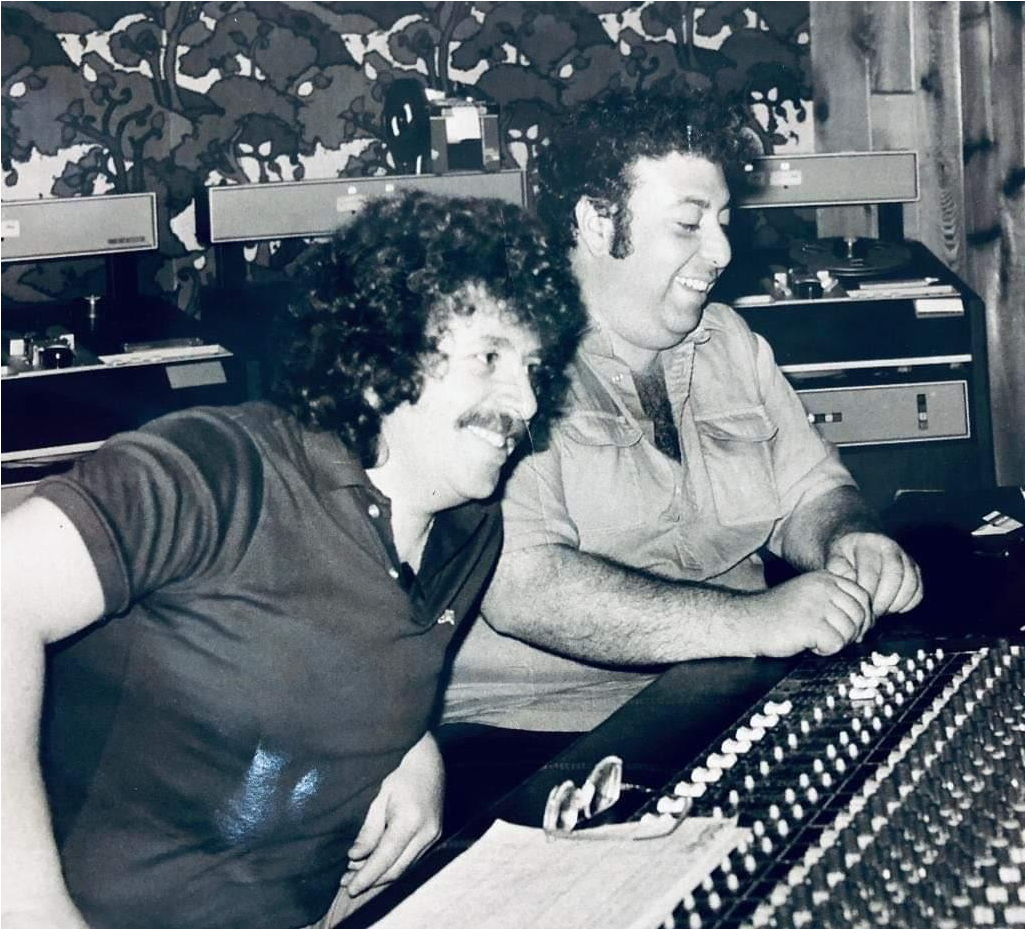It was a case of serendipity. In a post-ceasefire Armenia, the story behind Discotchari’s inaugural release is a testament to the bonding power of art, even in times of strife. The “deadstock discovery” – a term used for warehoused, sealed or discontinued records that have been removed from catalog – emerged when Discotchari stumbled upon a cache of ’45s featuring virtuosos John Bilezikjian and Raja Zahr, still encased in their original factory boxes from 1970. Available on November 3, 2023, this collaboration will be released on hundreds of 7” 45rpm units, plus digital downloads and streaming on all platforms.
Discotchari, a sublabel under Critique, is an L.A-based electronic label that selector and A&R Zach Asdourian and DJ and marketing professional Anaïs Gyulbudaghyan started in 2020, focused on reconstructing a long-lost back-catalog of rare groove music from artists of Armenian and Middle Eastern/SWANA identities to form an archive of songs that would be rediscovered by future generations of listeners. Over the years, Asdourian and Gyulbudaghyan learned the value of building a community of fans and Armenian “rare groovers” organically, rather than creating songs with the sole intent of achieving algorithmic rotation over the Internet.
“We started Discotchari based on our firm belief that, by increasing awareness of our music history, we can positively influence socio-political Armenian issues by providing a means for artasahmantsiner (non-Armenians) to experience our culture while also providing a consistent source of inspiration and pride for our barekamner (fellow Armenians) faced with an existential crisis,” says Asdourian. “In the last century we have seen smaller countries like Japan and Jamaica grow into cultural exportation phenomena, and in both cases music has played a big role in attracting interest from global markets. These economics reinforce the sovereignty of these countries, and the Armenia we know today has potential to become a prime destination for cuisine, nature, spirituality, innovation and all forms of artisanry.”

The release, Something Different, which features songs “Zulu Man” and “Chemical Reaction,” speaks to the souls of two extraordinary artists, John Bilezikjian and Raja Zahr. John Bilezikjian, largely recognized as the twentieth century’s most advanced oud musician, made an everlasting impression on the world of music, and as Asdourian called it in an interview with the Weekly, “a respectful iconoclast who ventured beyond the boundaries of ‘Western Armenian’ tradition set forth by Udi Hrant’s generation then maintained by John Berberian and others.” His commitment to decoding the oud’s history and uncovering its full potential continues to astound listeners, and naturally, as a scholar of Middle Eastern music, his library of 20th century Turkish encyclopedias, sheet music and pop records reveal a passion for confirming the Armenian (along with Greek and Jewish) origins of Ottoman classical music.
On the flip side, Raja Zahr’s journey from Beirut to Oklahoma and his eventual settlement in glitzy Los Angeles is one of adventure and passion. In the local scene of belly dance nightclubs, he established himself as a premier Arabic percussionist. The combination of John’s oud expertise and Raja’s percussion prowess resulted in a one-of-a-kind musical collaboration.
“Raja met John through a mutual acquaintance, and they developed a quick bond as they began touring across the Southwestern states, performing their repertoire of regional belly dance standards and writing original compositions together,” Asdourian said. “Of the nine songs they wrote together, two of them were recorded in 1970 at a studio owned by a friend of Raja and ended up pressed onto the vinyl records that Discotchari is releasing. According to Raja, other songs were recorded but got lost when the studio burned down.”

The two songs capture the mentality of two superstar musicians, at a very young age, adjusting to a new environment while trying to maintain a connection to their roots. The record features the ancient oud and darbuka colliding with the fallout of the global psychedelic movement. One song muses about melancholy and desperate feelings, and another leads listeners on an action-packed adventure of drum breaks.
And how did this release come to be? I’ll let Zach share.
“A year and a half ago, we did not have any set plans for the first Discotchari release, so we tried to focus on things that would help us gather the material and resources to take that next big step. We were very experimental in trying to build our audience, and ironically it was the idea of merchandising that actually led to the discovery of the Something Different 45s! John Bilezikjian had a label in the 70s called ‘Dantz Records.’ The label logo and album artworks are as clever as the name’s play on words,” explained Asdourian.
“I was able to track down and meet John Bilezikjian’s son, Johnny, to pitch this apparel idea I had, but when I told him that my main focus was reissuing Armenian dance records, he told me that his father had a record collection like no other, and that I should come check it out sometime,” Asdourian continued.
After purchasing this record collection from Johnny last year, Asdourian and Gyulbudaghyan discovered, among sealed vinyl of Elias Rahbani and Fairuz, a couple hundred copies of the Something Different 45s still in their original factory boxes from 1970. They were able to uncover the entire production run of these records nestled between CDs, cassettes and reel-to-reels, and reach an agreement with Johnny and Raja Zahr to give these unheard recordings the proper release that they deserved.
The songs are quintessentially 1970s, pulling in common psychedelic notions from the era’s “mind-expanding” music, a-la-Pink Floyd, Rush, Yes, Genesis and other introspective bands known for their complex instrumentals, and equally as complex, thoughtful lyricism. However, John and Raja found a way to blend Near Eastern flavors and a clear love for their roots with progressive and psychedelic rock. It’s interesting to see the dichotomy between the two similar-but-different songs.
“The song ‘Chemical Reaction’ written by Raja is the theme to its own world of sandy landscapes and scorching sun. From the very first seconds ‘Chemical Reaction’ takes you on a whirlwind of emotions. The scenarios are endless when it comes to properly categorizing the high times and low lunges this track can create on a dance floor,” describes Asdourian. “The song ‘Zulu Man’ on the other hand is John’s ode to 60s rock ballads, full of light, smooth, complex instrumental passages that equally put you at ease and keep you guessing where they’re going next. ‘Zulu Man’ is leaning more towards the obscurities of Gandalf and King Crimson than the soundtracks of the decade.”
With their first label release coming soon, Discotchari has no plans to stop anytime soon, with another rare Armenian discovery coming soon, along with an electronic album by a Yerevan-based artist.
“In our search for music, we aim to present a different angle on Armenian music, focusing on long-lost gems that never made it to the general public, and our upcoming releases completely reflect that,” says Gyulbudaghyan. “In line with our radio residency, we’re rolling out a series of club nights called ‘Silk Road Secret Agents’ that are focused on representing the music of legendary trade routes connecting Asia and Africa with Europe via the Middle East, sewing a rich tapestry of musical heritage as we go. We’re looking forward to collaborating with SWANA musicians, DJs and creatives, to reignite thousands of years of cultural exchange, to disrupt conventional perspectives and diffuse critical intel behind often elusive recordings.”
In a world where music serves as a reflection of our shared human experience, Discotchari’s work illustrates how art can transcend time and borders. Something Different, their inaugural release, is more than just a reissue of a long-lost gem. It’s an homage to the power of music to unify across cultural differences.
Gyulbudaghyan concluded, “We love Armenian records and want to turn their global nuances into a talking point, so we started the conversation ourselves on social media, and 18 months later, we’re now able to release a record that embodies the cultural fusion we are so passionate about highlighting.”
Something Different is available on Bandcamp and Soundcloud and features John Bilezikjian on oud and harpsichord and Raja Zahr on drums and Arabic percussion.

Artist: John Bilezikjian, Raja Zahr
Album: Something Different
Label: Discotchari
Catalog Number: DSC001
Barcode: 197644375011
Release Date: November 3, 2023
Genre: World, Psychedelic Rock
Format: digital + deadstock 7” 45rpm
License: courtesy of the artists
Rights: © ℗ Discotchari 2023
Originally pressed by Nose Records in 1970
Side A:
- Zulu Man – 3:17
Side B:
- Chemical Reaction – 2:37
Engineer: Drew Bennett
Producer: Paul Massaad
Liner Notes: Zach Asdourian
Personnel: Jim Zrake, John Mazo, Russ Viot



So cool! Thanks for sharing.
All love to Discotchari and their work❤️❤️
Looking forward to this one! Always love to support SWANA arts and culture. Our shared cultures are so rich with music and the talented musicians that make them. Lebanese & Armenian solidarity forever!